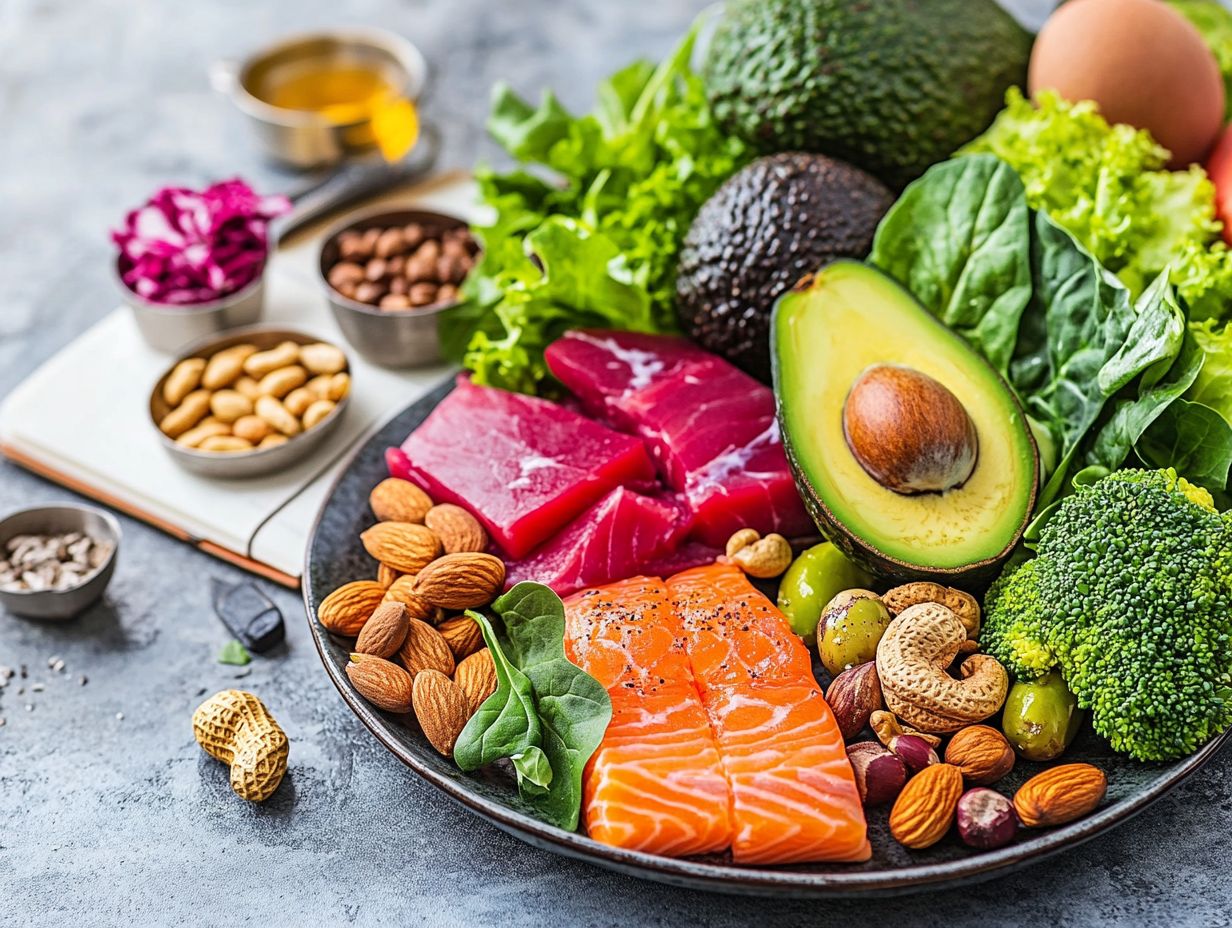Keto Diet and Hormones: Your Questions Answered
The keto diet has surged in popularity, mostly due to its promising weight loss benefits, including its ability to assist with medical conditions such as diabetes and epilepsy. However, you may wonder about its effects on hormones.
In this article, discover how the keto diet affects key hormones like insulin, ghrelin, and leptin, as well as cortisol and thyroid hormones. These hormones play vital roles in your body.
You ll learn about how this diet can assist in managing hormonal imbalances, including conditions like PCOS and the challenges of menopause. We will also address potential risks like menstrual irregularities and lowered libido.
You will find valuable tips for maintaining hormonal balance while embracing a keto lifestyle. Dive in to unravel the intricate relationship between the keto diet and your hormonal health!
Contents
- Key Takeaways:
- How Does the Keto Diet Affect Hormones?
- Can the Keto Diet Help with Hormonal Imbalances?
- 1. Polycystic Ovary Syndrome (PCOS)
- 2. Menopause
- 3. Thyroid Disorders
- What Are the Potential Risks of the Keto Diet on Hormones?
- How to Support Hormonal Balance on the Keto Diet?
- Frequently Asked Questions
- What are ketogenic foods?
- What is the relationship between the keto diet and hormones?
- Can the keto diet help regulate hormone imbalances?
- What are some potential side effects of the keto diet on hormones?
- Can the keto diet affect fertility?
- How long does it take for the keto diet to affect hormone levels?
- Are there any specific nutrients or supplements that can support hormone balance on the keto diet?
Key Takeaways:

- The keto diet can affect hormones, particularly insulin, ghrelin, leptin, cortisol, and thyroid hormones, impacting overall metabolic health.
- The keto diet may help with hormonal imbalances such as PCOS, menopause, and thyroid disorders.
- There are potential risks of the keto diet on hormones, such as menstrual irregularities, low libido, adrenal fatigue, and potential nutritional deficiencies.
How Does the Keto Diet Affect Hormones?
The ketogenic diet, characterized by its low carbohydrate intake, high fat content, and moderate protein intake, exerts significant effects on a range of hormones vital for regulating metabolic processes, appetite, and energy levels.
By drastically cutting back on carbohydrates, the keto diet prompts your body to enter a state of ketosis. When your body enters ketosis, it burns fat for energy instead of carbohydrates, leading to weight loss. This dietary strategy not only aids in weight loss but also impacts key hormones such as insulin, ghrelin, leptin, and cortisol, and thyroid hormones. Additionally, this metabolic state can influence important factors like blood pressure and total cholesterol levels.
These hormonal changes can lead to metabolic transformations with far-reaching implications for your overall health and wellness. This can potentially mitigate the risk of chronic diseases such as cancer and Alzheimer’s disease.
1. Insulin
Insulin is a crucial hormone that regulates your blood glucose levels and plays a significant role in your body s metabolic processes. This is especially relevant considering the ketogenic diet and its impact on weight loss and insulin resistance.
By dramatically cutting back on carbohydrate intake, the ketogenic diet naturally lowers your insulin levels. This reduction facilitates a switch from relying on glucose for energy to utilizing fat stores. Not only does this shift support weight loss, but it also improves your insulin sensitivity, allowing your body to respond more effectively to insulin.
For those grappling with insulin resistance a condition often linked to obesity and various metabolic disorders this can have profound benefits. It promotes a healthier metabolic state, aiding in weight management and potentially reducing the risk of complications such as cardiovascular disease.
2. Ghrelin
Ghrelin, commonly known as the ‘hunger hormone’, plays a pivotal role in stimulating your appetite and regulating your energy balance. This function can be notably influenced by the ketogenic diet and other low-carb diets.
This high-fat, low-carbohydrate approach aligns with various metabolic processes and may result in a significant reduction in ghrelin levels. Consequently, you may notice a decrease in hunger sensations, which is particularly advantageous if you’re aiming to shed some pounds.
By effectively managing your hormonal responses, the ketogenic diet not only helps you control your appetite but also cultivates a sense of satiety that extends the time between meals. As a result, with less frequent feelings of hunger, sticking to your weight loss goals can become much more attainable. This approach fosters a healthier relationship with food and supports your overall hormonal balance. Incorporating ketogenic foods like avocados, nuts, and lean proteins can further enhance these benefits.
Ready to dive into the keto lifestyle and transform your hormonal health? Let’s get started!
3. Leptin
Leptin plays a crucial role in regulating your energy balance by communicating with your brain about your body’s fat reserves, and its levels can indeed be influenced by the ketogenic diet and other high-protein diets.
When you embark on a ketogenic diet, which is high in fat and low in carbohydrates, the shift in macronutrient ratios can lead to changes in the production and secretion of leptin. Typically, with greater fat availability, your leptin sensitivity may improve, facilitating more effective communication between this hormone and your brain concerning hunger and satiety. This is beneficial for long-term weight control and metabolic health.
As a result, enhanced leptin signaling can lead to a decrease in appetite, aiding in fat metabolism and playing a vital role in weight management.
These shifts in leptin levels and signaling have significant implications for maintaining energy homeostasis, especially for those of you looking to optimize your health through thoughtful dietary choices.
4. Cortisol
Did you know that Cortisol, often called the stress hormone, plays a vital role in your metabolism? Its levels can be significantly influenced by the ketogenic diet, ultimately affecting your energy levels and metabolic health. Elevated cortisol levels have also been linked to conditions such as osteoporosis and kidney stones.
Produced by the adrenal glands in response to stress, chronically elevated cortisol levels can lead to a host of health problems, including weight gain and muscle loss. Interestingly, the ketogenic diet, which emphasizes low carbohydrate intake and high fats, may offer a solution by helping to regulate cortisol levels. Adhering to proper dietary guidelines can further mitigate these risks.
By encouraging your body to utilize fat for energy rather than relying predominantly on glucose, you might find that your energy levels stabilize, thereby reducing the stressors that trigger cortisol release.
This improved metabolic efficiency can enhance how well your body uses energy, supporting a balanced approach to energy management and contributing to your overall well-being.
5. Thyroid Hormones
Thyroid hormones play a vital role in regulating your metabolism and energy levels, and the balance of these hormones can be influenced by the dietary changes that come with the ketogenic diet and other low-carb diets.
When you embark on a ketogenic journey, characterized by a high intake of fats and a significant reduction in carbohydrates, you may notice some shifts in your thyroid hormone levels. This transition may decrease thyroxine (T4), the primary hormone from your thyroid gland. Since T4 is crucial for your metabolic rate, a reduction in its levels might mean lower energy expenditure, affecting how efficiently your body burns calories. It’s also important to monitor levels of essential nutrients like B vitamins and omega-3 fats when following this diet.
Some research indicates that sticking to this diet over the long term could impact the conversion of T4 to the more active form, triiodothyronine (T3). Understanding this is important for anyone considering or currently following the ketogenic dietary model or other popular diets like the Atkins diet, Paleo diet, South Beach diet, and Dukan diet.
Can the Keto Diet Help with Hormonal Imbalances?

The ketogenic diet has garnered considerable attention, not just for its weight loss advantages but also for its potential in addressing hormonal imbalances linked to various medical conditions, including Polycystic Ovary Syndrome (PCOS), menopause, and thyroid disorders. The diet’s impact on appetite hormones like ghrelin and leptin further underscores its role in hormonal regulation.
By drastically cutting back on carbohydrates and emphasizing healthy fats, this dietary approach may enhance hormonal function and mitigate symptoms associated with these issues. The keto diet also influences insulin levels and appetite hormones, which can help balance hormones, presenting a compelling option for those in search of relief from hormonal disruptions. Following dietary guidelines from associations like the American Heart Association can provide additional benefits.
1. Polycystic Ovary Syndrome (PCOS)
Polycystic Ovary Syndrome (PCOS) is a prevalent endocrine disorder marked by hormonal imbalances. The ketogenic diet may offer significant benefits in managing its symptoms, including improving insulin sensitivity and aiding in weight loss.
If you re dealing with PCOS, you re likely familiar with the challenges of insulin resistance. This condition makes it harder for your body to use insulin effectively, intensifying issues like weight gain and irregular menstrual cycles. By embracing a ketogenic diet that is low in carbohydrates and rich in healthy fats, you may find it easier to stabilize your blood sugar levels and enhance your insulin sensitivity.
This diet not only helps you lose weight but can also positively impact hormonal balance. This may lead to more regular ovulation and improved fertility outcomes. It can also help regulate menstrual cycles and manage common symptoms associated with PCOS. Integrating a ketogenic eating pattern into your lifestyle could serve as a valuable strategy in navigating the complexities of PCOS.
2. Menopause
During menopause, you ll experience significant hormonal shifts that may cause weight gain and various health issues. The ketogenic diet might just be the solution to ease these symptoms by addressing blood sugar regulation and overall energy levels.
This low-carb, high-fat dietary approach can help stabilize your insulin levels and encourage fat burning, which is especially beneficial during this transitional phase. By cutting back on carbohydrates, you may start burning fat for energy, which can help curb your appetite and boost your energy levels. The ketogenic diet also supports better blood sugar regulation, potentially lowering the risk of insulin resistance often associated with menopause. Following this diet may also improve total cholesterol and blood pressure levels, contributing to overall cardiovascular health.
With its emphasis on whole foods like avocados, nuts, and lean proteins, this eating plan not only aids in weight management but also promotes heart health. This diet presents a compelling option for women looking to enhance their well-being during this important time.
3. Thyroid Disorders
Thyroid disorders can significantly affect your metabolism and energy levels. The ketogenic diet offers a compelling option for those grappling with these challenges.
Embracing a high-fat, low-carbohydrate ketogenic approach may provide unique advantages if you’re experiencing difficulties with thyroid function. By shifting your body s reliance from carbohydrates to fats for energy, this diet could help stabilize insulin levels and enhance metabolic rates. Such transformations may lead to a better hormonal balance and notably impact your thyroid hormone levels.
For those dealing with hypothyroidism, it’s essential to explore how this diet might boost your overall energy and well-being, ultimately promoting a more efficient metabolic response as you navigate your condition.
What Are the Potential Risks of the Keto Diet on Hormones?
The ketogenic diet presents many benefits for weight loss and metabolic health. However, it s essential to consider the potential risks it may pose to your hormonal balance.
Issues such as menstrual irregularities, diminished libido, and adrenal fatigue can arise from the drastic shifts in dietary macronutrients associated with the keto approach. These changes can sometimes lead to nutritional deficiencies and disrupt various hormonal systems.
It s vital to understand these risks as you contemplate the keto diet. Ensure that you maintain balanced nutrition and hormonal health throughout your weight reduction journey.
1. Menstrual Irregularities
Menstrual irregularities can be a potential concern for you if you’re following the ketogenic diet, largely due to the significant dietary changes that can impact your hormonal balance.
As you transition to a low-carbohydrate, high-fat diet, you might notice shifts in your insulin sensitivity and overall energy levels, which could, in turn, affect the regularity of your menstrual cycles. Hormones like estrogen and progesterone are closely tied to your diet, and a reduction in carbohydrate intake might lead to altered levels of both hormones.
You may find that your cycle length changes, the intensity of your flow varies, or you might even miss periods altogether as your body adjusts to ketosis. Additionally, this dietary approach can influence stress hormones like cortisol, potentially leading to further menstrual disturbances.
Understanding these hormonal connections is crucial for you as you aim to maintain healthy cycles while embracing the ketogenic lifestyle.
2. Low Libido
Low libido can emerge as a side effect of the ketogenic diet, where significant shifts in your dietary intake may influence the hormonal levels that govern your sexual health.
When you embrace this high-fat, low-carbohydrate eating plan, your body embarks on a metabolic transition, often resulting in altered insulin and cortisol levels. These hormonal changes can subsequently impact testosterone and estrogen, which are essential for maintaining your sexual drive and function.
As your body adjusts to utilizing fat for fuel instead of carbohydrates, you might experience fluctuations in energy and mood, both of which can further affect your sexual desire. For some, this dietary approach may initially dampen libido, raising questions about the long-term implications for intimate relationships and overall sexual well-being.
3. Adrenal Fatigue

Adrenal fatigue is a condition you may encounter when adopting a ketogenic diet, particularly due to its effects on stress hormones and overall hormonal equilibrium.
As you embark on a ketogenic lifestyle, you ll likely notice significant changes in your nutrient intake, which can unintentionally affect how your body manages stress. The reduction of carbohydrates may trigger an initial spike in cortisol levels, the key hormone responsible for your stress response, as your body adjusts to relying on fats for energy.
While many individuals turn to the ketogenic diet for its potential benefits in weight loss and enhanced metabolic health, it s crucial to acknowledge that this dietary shift can lead to feelings of fatigue if your adrenal glands struggle to keep up. Therefore, striking a balance in your dietary choices becomes essential as you pursue ketogenic principles while ensuring optimal adrenal function.
How to Support Hormonal Balance on the Keto Diet?
To support hormonal balance while adhering to the ketogenic diet, you should prioritize nutrient-dense foods, healthy fats, and sufficient protein intake, alongside lifestyle practices like proper hydration, quality sleep, and effective stress management.
Achieving and maintaining hormonal equilibrium is crucial for maximizing the benefits of the keto diet, especially concerning weight loss and overall health. By concentrating on these key areas, you can nourish your body adequately while reaping the metabolic advantages of a low-carb lifestyle.
1. Eat a Variety of Nutrient-Rich Foods
Eating a diverse array of foods rich in nutrients is essential for maintaining hormonal balance while following the ketogenic diet. These foods are packed with the vital vitamins and minerals your body needs for optimal health.
By incorporating a variety of options, you not only elevate your dining experience but also enhance the nutritional quality of your meals. Are you ready to elevate your meals? Healthy fats from sources such as avocados, olive oil, and nuts are critical. They provide the essential fatty acids that support both brain function and cardiovascular health.
The proteins you choose grass-fed meats, fish, and eggs serve a dual purpose: promoting muscle repair and helping you sustain your energy levels. The essential vitamins and minerals found in leafy greens, seeds, and low-carb vegetables play a crucial role in ensuring your body receives a complete spectrum of nutrients necessary for thriving on a ketogenic lifestyle.
Adopting these well-rounded eating habits can significantly boost your metabolic efficiency and support steady energy levels throughout your day.
2. Incorporate Healthy Fats
Incorporating healthy fats into your ketogenic diet is crucial for achieving hormonal balance. These fats serve as a stable energy source while also supporting hormone production.
Among the array of healthy fats, omega-3 fatty acids truly stand out due to their vital role in promoting heart health and reducing inflammation, both of which are essential for optimal hormone synthesis.
Make fatty fish, walnuts, and flaxseeds staples in your diet, as they are rich in these beneficial fats. Don t overlook monounsaturated fats found in avocados and olive oil; they play a key role in regulating insulin and cholesterol levels as well.
By prioritizing the quality and source of the fats you consume, you can enhance not only your overall well-being but also support essential hormonal functions that influence mood, metabolism, and reproductive health.
3. Monitor Your Protein Intake
Monitoring your protein intake is crucial on the ketogenic diet, as it ensures you maintain adequate muscle while promoting hormonal balance and overall health.
Finding the right balance in protein consumption is essential for anyone committed to this low-carb way of eating. It supports your muscle preservation and plays a key role in regulating hormones like insulin and glucagon.
Research suggests that those following the keto diet should aim for protein to make up approximately 20-25% of their daily calorie intake, adjusting based on their activity levels and personal goals.
Ensuring you have enough protein helps prevent muscle loss, especially during a caloric deficit, which is vital for maintaining lean body mass. Plus, protein aids in producing hormones that help manage appetite and metabolic rates, ultimately contributing to your overall well-being and the effectiveness of the keto diet.
4. Stay Hydrated
Staying hydrated is essential on the ketogenic diet. Proper hydration is crucial for supporting electrolyte balance and overall health, significantly impacting hormonal function.
As you embrace this low-carb lifestyle, you may find yourself more prone to dehydration due to lower insulin levels and reduced glycogen stores. To maintain adequate fluid intake, it’s important to drink enough water throughout the day.
Incorporating hydrating foods like leafy greens and cucumbers in your meals can also help. Ensuring you have sufficient electrolyte levels is vital; incorporating potassium, magnesium, and sodium supplements can help fend off the pesky symptoms associated with the ‘keto flu’.
Ultimately, being mindful of your hydration not only helps you manage your energy levels but also enhances mental clarity. This awareness is a fundamental aspect of achieving success on your ketogenic journey.
5. Get Adequate Sleep
Getting adequate sleep is crucial for maintaining hormonal balance while you navigate the ketogenic diet, as sleep plays a vital role in regulating various hormones.
Hormones such as insulin, cortisol, and leptin are directly influenced by the quality and duration of your sleep, affecting everything from metabolism to appetite control. For those embracing a ketogenic lifestyle, ensuring you get sufficient sleep can significantly enhance fat burning and reduce cravings, both of which are essential for achieving your health and weight loss goals.
To improve your sleep quality, consider these strategies:
- Establish a consistent bedtime routine.
- Create a comfortable sleep environment.
- Limit your exposure to screens before bedtime.
- Monitor your carbohydrate intake throughout the day.
Additionally, incorporating relaxation techniques like meditation or deep breathing exercises can promote restorative sleep, ultimately supporting your hormonal health, blood pressure, and overall well-being.
6. Manage Stress Levels

Managing your stress levels is essential for maintaining hormonal balance, especially when you’re following the ketogenic diet. High stress can lead to increased cortisol production, which can throw your hormonal equilibrium into disarray. High stress can also negatively impact your insulin sensitivity and increase your risk of developing metabolic changes.
To effectively address these stressors, consider integrating mindfulness techniques like meditation and deep-breathing exercises into your routine. These practices not only promote relaxation but also help keep your mood stable, which is vital when adhering to low-carb diets like keto.
Additionally, incorporating regular physical activity whether through brisk walking, yoga, or strength training does wonders for your overall fitness while significantly reducing stress levels and managing energy levels. Proper exercise can also help in managing insulin resistance and enhancing the ketosis process.
This holistic approach supports your body’s hormonal health, allowing you to fully enjoy the benefits of your keto lifestyle without letting stress derail your progress.
7. Consult with a Healthcare Professional
Consulting with a healthcare professional is a wise move for anyone considering the ketogenic diet. This will ensure you receive the proper guidance and support needed to maintain hormonal health and avoid potential nutritional deficiencies.
This step is particularly crucial since the keto diet can significantly alter your metabolic processes and may lead to hormonal imbalances if not managed correctly. A qualified health expert can offer personalized insights into how this dietary approach might influence important factors like insulin sensitivity, thyroid function, healthy fats intake, and overall hormonal balance. To understand more about the connection between the keto diet and mental health, check out Keto Diet and Mental Health: Your Questions Answered.
They can also help you navigate potential risks associated with a drastic reduction in carbohydrate intake, which may not be suitable for everyone. With their expertise, you can confidently tackle the complexities of this diet, ensuring you enjoy its benefits while minimizing any adverse effects on your health.
Frequently Asked Questions
What are ketogenic foods?
Ketogenic foods are high-fat, low-carbohydrate foods that help your body enter and stay in ketosis. These include avocados, nuts, seeds, olive oil, fatty fish, meat, and dairy products.
What is the relationship between the keto diet and hormones?
The keto diet, similar to the Atkins diet and Paleo diet, significantly impacts hormone levels in the body. By restricting carbohydrates and increasing healthy fats, the body enters a state of ketosis, affecting the production and balance of hormones such as insulin, cortisol, and reproductive hormones.
This diet also influences blood glucose levels and the production of ketone bodies, which are essential for maintaining energy levels.
Can the keto diet help regulate hormone imbalances?
Yes, the keto diet can help regulate hormone imbalances by reducing insulin levels and promoting a healthy balance of hormones. This is particularly beneficial for individuals with conditions such as PCOS, insulin resistance, diabetes, or those with a history of epilepsy.
What are some potential side effects of the keto diet on hormones?
Like any diet, the keto diet can have potential side effects on hormones. Some individuals may experience changes in menstrual cycles, increased cortisol levels, or fluctuations in thyroid hormone production. Additionally, there is a risk of developing kidney stones and nutritional deficiencies if the diet is not properly managed.
Consulting with a healthcare professional can be your key to unlocking the full benefits of the keto diet and ensuring it suits your individual needs.
Can the keto diet affect fertility?
The keto diet may positively or negatively impact fertility, depending on the individual. Some studies suggest that it can improve fertility in women with PCOS, while others indicate it may decrease fertility in certain individuals. Before making any dietary changes while trying to conceive, it s crucial to consult with a healthcare professional. You may also want to consider other high-protein or low-carb diets based on your unique needs.
How long does it take for the keto diet to affect hormone levels?
The time it takes for the keto diet to affect hormone levels varies for each individual. Some may notice changes within a few weeks, while others may take longer. Listen to your body and adjust your diet as needed for optimal hormone balance, especially if you are managing diabetes, epilepsy, or other medical conditions influenced by dietary changes.
Are there any specific nutrients or supplements that can support hormone balance on the keto diet?
Yes, certain nutrients and supplements can support hormone balance on the keto diet. These include omega-3 fatty acids, vitamin D, B vitamins, and magnesium.
It’s crucial to consult a healthcare professional before adding supplements to your diet. This ensures they are safe and tailored to your individual needs.
For instance, omega-3 fatty acids, which are healthy fats found in fish and flaxseeds, are recommended for overall cardiovascular health. By incorporating omega-3s into your keto diet, you can enhance your hormone balance and boost overall health!






